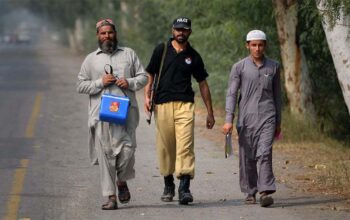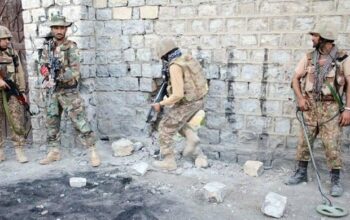By Staff Reporter
ISLAMABAD: Pakistan’s newly elected lawmakers will take their oaths on Feb. 29, ending weeks of uncertainty and deadlock after a fractured general election that left no party with a clear majority in the lower house of parliament.
The National Assembly, the lower house, will also elect its speaker and deputy speaker, who will preside over the legislative business and the election of the prime minister, the leader of the government.
The country’s general elections on Feb. 8 resulted in a hung parliament, with no single party or alliance securing enough seats to form the government. The largest bloc in the house was composed of independent candidates, who had the backing of Imran Khan, the former prime minister, and his party, Pakistan Tehreek-e-Insaf (PTI).
But these candidates could not run under the PTI banner after the party lost its election symbol in a legal dispute on intra-party polls. Nor could they claim the seats reserved for women and religious minorities, which are allocated to parties based on their proportional representation in the house.
The PTI -backed independent candidates joined a religious party to claim reserved seats, but the election commission has yet to allocate them, saying PTI has not submitted the potential candidate names before the deadline.
This created an opportunity for other parties to woo the independents and form a coalition. The Pakistan Muslim League-Nawaz (PMLN), the party of Nawaz Sharif, the three-time former prime minister, managed to strike a deal with the Pakistan Peoples Party (PPP), the party of Bilawal Bhutto-Zardari, the son of former Prime Minister Benazir Bhutto, who was assassinated in 2007.
The two parties agreed to share the top offices of the parliament and the government, and to nominate a consensus candidate for the prime minister. The negotiations between the PML-N and the PPP took longer than expected, causing confusion and speculation about the date of the first session of the National Assembly, which is constitutionally bound to be held within 21 days of the election, or by Feb. 29.
A senior official at the assembly secretariat confirmed that the session would be held on Feb. 29 at 11 am. He said the secretariat had convened the session as it could not delay it any further under the constitution.
Earlier in the day, some local media outlets reported that the speaker of the outgoing assembly, Raja Pervaiz Ashraf, a PPP leader, had summoned the session after President Arif Alvi, a close ally of Khan, refused to do so.
Alvi, who was elected in 2018 as a PTI candidate, reportedly objected that the house was incomplete as the Election Commission of Pakistan had not yet finalized the allocation of the reserved seats. He has not responded to a summary sent by the parliamentary affairs division last week, requesting him to summon the session. Under Article 91(2) of the Constitution, the president is required to call the session within 21 days of the general elections, which were held on Feb. 8. If he fails to do so, the National Assembly secretariat can bypass him and summon the session itself.
Some reports suggested that Alvi was waiting for the notification of the women lawmakers of the Sunni Ittehad Council (SIC), the religious party that joined Khan’s coalition after the elections, on reserved seats. The SIC, which did not have any seats in the previous assembly, now has 92 seats in the lower house, including one seat won by an independent candidate who later joined the party.
The official of the National Assembly secretariat said the delay in the notification of reserved seats was not a valid reason to postpone the session, as the SIC had to follow the constitutional process and respond to any objections raised by the Election Commission.
Ishaq Dar, a former finance minister and a senior PML-N. leader, accused President Alvi of violating the constitution by returning the summary to call the session.
“Article 91 (2) of the constitution is very clear,” he told reporters in Islamabad. “It says, ‘The National Assembly shall meet on the twenty-first day following the day on which a general election to the Assembly is held, unless sooner summoned by the President.’”
Dar said this meant that the assembly session would be “automatically held on Feb. 29.”
The Election Commission, meanwhile, issued a notification, saying that it was mandatory to hold the presidential election within 30 days of the general election.
“On Feb. 29, 2024, all assemblies will come into existence, thereby completing the required Electoral College for the election of the President,” it said. “The Election Commission will issue the schedule for the election of the President and the public notice on March 1, 2024.”
The president is elected by an indirect vote of the members of the National Assembly, the Senate, and the provincial assemblies. Former president Asif Ali Zardai is the joint candaidate of the PML-N and the PPP for the presidency.
Copyright © 2021 Independent Pakistan | All rights reserved




